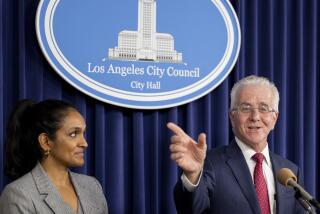Aquino Puts Controversial Land Reform Into Effect
- Share via
MANILA — Philippine President Corazon Aquino on Wednesday signed a sweeping and controversial land reform program aimed at redistributing large tracts of farm acreage--virtually all private agricultural holdings in the nation--to millions of landless peasants.
Presidential spokesman Teodoro Benigno said the decree covers all public and private agricultural land except that held by “cultural minorities.” He said Aquino has told members of her Cabinet to support the program or resign.
However, the decree failed to address the critical question of just how much land a single individual can own, leading opposition politicians to charge that the president--herself from a wealthy Philippine family--is succumbing to pressure from rich landholders.
The decree, which Aquino signed in the last days before her sweeping powers are to be curtailed by a new Congress, will distribute at least 13 million acres to more than 2 1/2 million peasants. It represents a compromise between those who pressed for a detailed presidential decree limiting private holdings and those who maintained that the new Congress should implement such a program. The Congress will convene Monday.
Philippine landlord associations opposed the plan as confiscatory, and some threatened to organize armed groups to prevent the takeover of estates. These landowners--and even some members of Aquino’s Cabinet--had opposed a 17-acre limit proposed in earlier drafts of the decree, saying such a limit would hurt farm productivity and scare off agribusiness investors. The decree leaves the acreage limit up to Congress.
Deogracias Vistan, president of the Land Bank of the Philippines, one of the main agencies that is to implement the measure, said last month that much of the controversy centered on 3.2 million acres of privately owned sugar, coconut and banana plantations.
He urged then that Aquino carefully study the effects that a low limit on land ownership would have on farm productivity and cautioned that entrepreneurs planning to invest large sums of money to convert increasingly unprofitable sugar land into prawn farms might be scared away.
Will Distribute Own Land
On Wednesday, at a news conference, Aquino seemed to disregard this. And she repeated a pledge she made in March--to place her family’s 14,820-acre sugar estate under the decree.
Aquino said the plantation, named the Hacienda Luisita, will be included. “This is a comprehensive land reform program, so definitely Hacienda Luisita will be affected by this program,” she said.
Spokesman Benigno told reporters that Aquino had warned her ministers that she expects them to support the program.
“Whatever differences there are, we have to lay (them) aside,” he quoted the president as saying. “If anyone here cannot live with it, either he keeps quiet or resigns. We can’t afford any dissensions at this point.”
The final decree, which provides support services but no limit on the size of landholdings, was condemned by the left-wing opposition, as well.
“We are against the decree,” Felicisimo Patayan, vice chairman of the Philippine Peasants Movement, said. “We believe many provisions of the decree are anti-peasant.”
Opposition from many landholders was so vehement that some sugar planters on Negros Island have threatened to organize private armies to defend their plantations.
Land reform has traditionally been among the most controversial issues in the Philippines, where 70% of the population lives in rural areas. More than a dozen land reform programs enacted this century have failed because of lack of money or political will, or opposition from powerful families.
Communist rebels have made land reform one of the main goals of their 18-year insurgency.
Aquino told her news conference that Congress must decide on acreage limits on private holdings within 90 days. If it fails to do so, she said, the administration will mandate its own limits.
Previous land reform drafts prepared by the government would have restricted private holdings to about 17 acres by 1997. Critics said 17 acres was too small for commercial farming, but proponents said farmers could form cooperatives or enter into lease agreements with agricultural companies.
Manila newspapers said Wednesday that Aquino had been presented with nearly 30 land reform drafts in the last few days as she raced to preempt congressional action. She pledged to address the issue of land reform when she took power last year.
In Washington on Wednesday, Sen. Jesse Helms (R-N.C.), ranking Republican on the Foreign Relations Committee, criticized Aquino’s land reform measure, saying she is ignoring the Philippine constitution.
‘No Authority’
“She had no authority to do so, not even in the cause of reform,” said Helms, an archconservative who under present arrangements would become chairman of the Foreign Relations Committee if his party regained control of the Senate.
“There is nothing in the Aquino track record to suggest that she is enamored with the democratic process,” Helms added.
Speaking to a conference on the Philippines sponsored by a private group called the U.S. Global Strategy Council, the senator rebuked the State Department and the CIA for “in effect, mounting a coup against an ally” by urging the departure of former Philippine President Ferdinand E. Marcos 1 1/2 years ago.
He called Marcos, who is under “island arrest” on the Hawaiian island of Oahu, an ally and friend of the United States.
More to Read
Sign up for Essential California
The most important California stories and recommendations in your inbox every morning.
You may occasionally receive promotional content from the Los Angeles Times.










